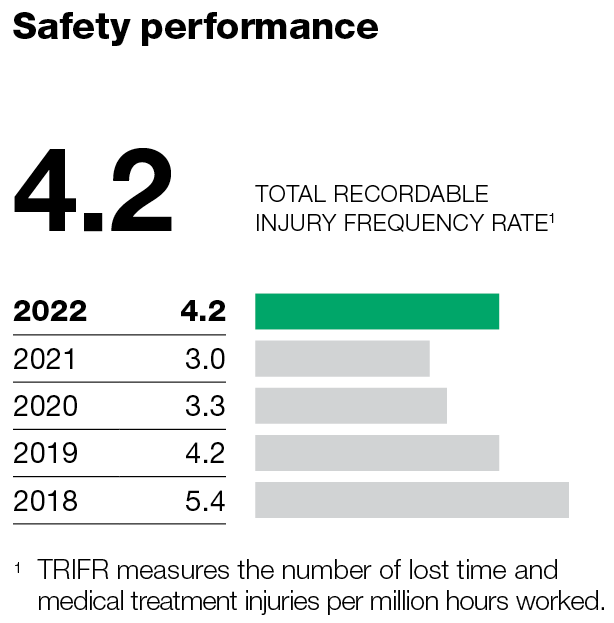
WesCEF - Team member wellbeing and operating safely
Team member wellbeing
WesCEF continues to embed psychological wellbeing as an accepted and sustainable health and safety principle with its workforce. This has been achieved by continuing internal mental health online training for all employees, and external online training for supervisors; the introduction of quarterly Wellness webinars; providing resources and information through the WesCEF intranet (Connect); and actively supporting key community events, such as R U OK? Day and Mental Health Week. Employee mental health (Building Resilience) training completion is at 93 per cent and supervisor training is at 75 per cent as at 30 June 2022.
To combat the risk of increased mental health issues during the COVID-19 pandemic, WesCEF increased mental health support for all employees. The long duration of COVID-19 impacted employees in various ways – isolation for people working from home, adjusting to new protocols for people onsite such as personal protective equipment, social distancing, quarantining control rooms, rapid antigen testing, and managing fear of exposure. WesCEF established, implemented and supported a process to enable employees to work from home, which included guidance about how to remain connected to their teams. WesCEF engaged a professional mentor and leadership coach, Ben Crowe, for an employee online session about finding perspective and resilience through challenging times. More than 580 employees (40 per cent of the WesCEF workforce) joined the session. Survey feedback from Ben Crowe’s online session was received from more than 100 participants, and 95 per cent of respondents felt the webinar provided them with tips and tools on becoming more resilient in challenging times, with many commenting it had positively changed their mindset, and given them more confidence and a stronger sense of purpose.
From 1 January to 31 March 2022, 28 employees and five family members accessed Employee Assistance Program counselling services, representing a 15 per cent decrease in the number of sessions compared to the previous quarter. The increased focus on mental wellbeing saw minimal disruption to the business and a negligible adverse impact to employee mental health.
Looking forward, WesCEF plans to introduce a peer support network for mental health and, with COVID-19 restrictions easing, recommence supportive community events, such as The Fathering Project.
Operating safely

WesCEF’s operations include the manufacture of hazardous material and, as such, manage several inherent high potential (HiPo) risks – risks that have the potential to cause serious harm or worse. These risks are, in most cases, unable to be controlled via elimination and therefore need comprehensive controls to suitably mitigate the risk.
During the financial year, there were 21 HiPo - no control - incidents, compared to 20 for the same period last year. Of the 21 incidents, 15 relate to dropped objects, which supports continued focus in this area.
WesCEF continued to expand its HiPo risk management program, including the rollout of critical control checklists and the development of performance standards that allow individual critical controls to be assessed for effectiveness. This year WesCEF's total recordable injury frequency rate (TRIFR) was 4.2.
A suite of new metrics based on the completion of critical control checklists were developed, tracked and reported. Critical control checklists have also been embedded into pre-task risk assessment processes to ensure all relevant critical controls are in place prior to a task commencing.
WesCEF will expand critical control verification activities to include multi-level verification of performance standards for each HiPo risk. The establishment of improved reporting metrics to drive HiPo risk management will ensure appropriate and ongoing
focus on HiPo risk.
GRI 103-1, GRI 103-2, GRI 103-3, GRI 403-1, GRI 403-2, GRI 403-3, GRI 403-4, GRI 403-5, GRI 403-6, GRI 403-7